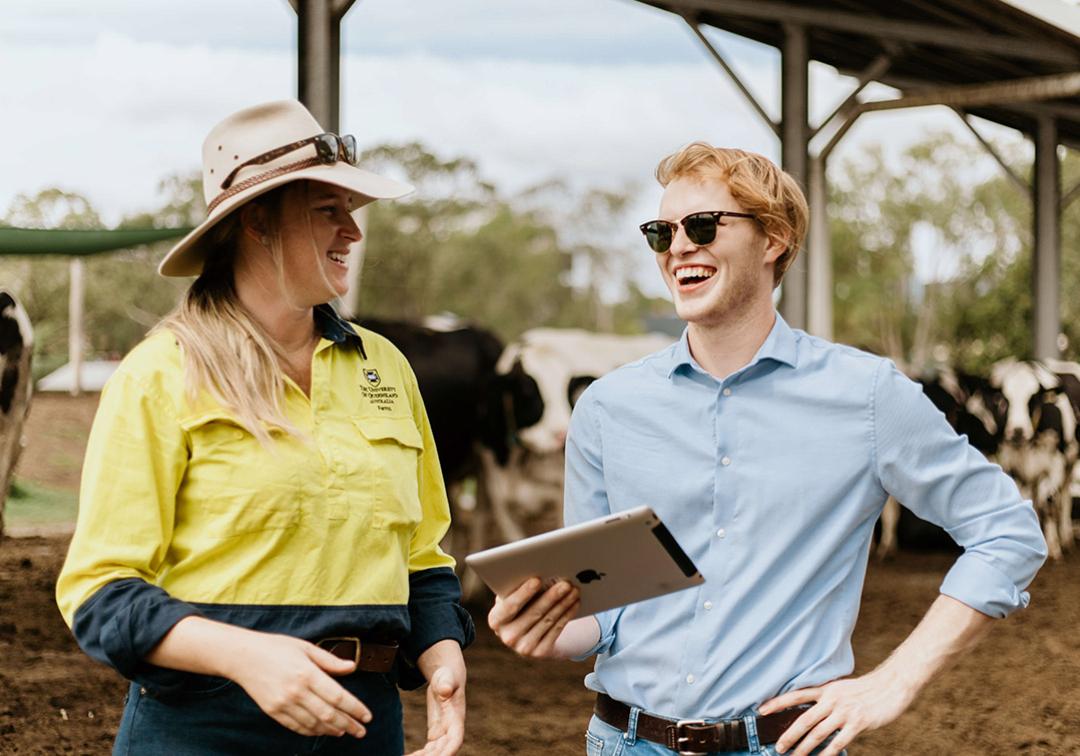
Graduate Diploma in Agribusiness
Overview
Develop a keen market focus, commercial awareness, and an innovative and international outlook to succeed in the food and fibre industries.
This program is designed for recent business, agricultural or rural science graduates, and for established professionals wanting to upgrade their management skills or redirect their career into agribusiness.
During your year of study, you'll gain a high level of specialised knowledge of agribusiness management together with business and communication skills.
Our academics and industry experts share actionable insights on contemporary agribusiness issues such as sustainability, globalisation, food security and international trade. You'll learn how agribusinesses from different contexts could respond to global opportunities and challenges.
You’ll explore all aspects of the supply chain to confidently work with small- and large-scale producers, processors, transporters, financial institutions and Australian and international retailers to deliver high-quality and affordable products.
Graduate with a market-oriented focus, commercial awareness, an innovative and heightened global outlook, and the required technical skills to work in the food and fibre industries.
You can expect to find almost immediate work in the food and fibre industries in managerial, administrative or research roles.
The Graduate Diploma in Agribusiness can provide a pathway into the master's program.
Program highlights
- Access some of the best animal and agricultural facilities in the Southern Hemisphere across more than 1,000 hectares of subtropical farmland.
- Benefit from regular contact with practising managers and their businesses through a hands-on approach to learning.
- Gain exposure to the latest technological advancements in agriculture through practicals and industry engagement.
- This program can be completed online.
Fields of study
Tailor your studies to suit your goals. This program offers these options:
- Rural Development
How you'll learn
Your learning experiences are designed to best suit the learning outcomes of the courses you choose.
- Lectures
- Tutorials
- Fieldwork
- Workshops
What you'll study
At UQ, degrees are called 'programs' and subjects are called 'courses'. Here's a sample of the courses you could study in this program:
- Leadership in Rural Industries and Communities
- Agribusiness Planning and Management
- Global Challenges in Agriculture
- Applied Market Research
Career possibilities
Postgraduate study can take you anywhere. Depending on which field you choose, here are some of the careers you could be on your way to:
- Agribusiness manager
- Agribusiness researcher
- Agribusiness banker
- Commodity trader
- Export trader
- Sales and marketing professional
- Supply chain manager
- Property manager
- Agricultural economist
- Export marketing officer
Average annual salary range
Logistics Manager
seek.com.au
Average annual salary range
Farm Manager
seek.com.au
Next steps after graduation
Your scientific expertise and knowledge of agribusiness managerial principles will place you in high demand within the Australian and international agriculture sectors.
You’ll graduate with a keen market focus, commercial awareness, innovative approach, and relevant technical skills.
You can expect to find employment in:
- government departments and agencies
- research institutions, including universities and CSIRO
- banks, financial institutions, and investment and insurance companies
- agribusinesses, such as agricultural service companies, seed companies, food producers and agricultural consultancies
- biosecurity, extension and animal production enterprises
- organisations involved in production, post-harvest and marketing of horticultural products
- commodity trade, sales and marketing companies
- export marketing and management companies
- feed mills, stock equipment manufacturers, and livestock and poultry health companies within allied industries
- property management companies
- supply chain management organisations
- tourism bodies.
Alternatively, you can further your research ambitions and continue into the Master of Agribusiness program.
Events
See all eventsStories
See all stories
Uni life
What's it really like to study agribusiness and agriculture at UQ?
5-minute read
Stories
See all stories
Uni life
What's it really like to study agribusiness and agriculture at UQ?
5-minute read

UQ people
Meet Sai from Myanmar, studying Agribusiness in Australia
5-minute read
Entry requirements
Entry requirements
To be eligible for entry, you'll need:
- A bachelor's degree (or equivalent) in any discipline, or
- have completed post-secondary studies and/or have 2 years full-time equivalent, relevant work experience (see below).
- A bachelor's degree (or equivalent) in any discipline, or
- have completed post-secondary studies and/or have 2 years full-time equivalent, relevant work experience (see below).
Relevant work experience
Relevant work experience means work:
- in managerial or supervisory roles in any agribusiness firm along the agrifood supply chain, or
- in any other profession where you’ve built a portfolio demonstrating your agribusiness expertise.
Related programs
Depending on your previous qualifications and current goals, you might want to consider
one of these related programs:
English language requirements
IELTS overall 6.5; reading 6; writing 6; speaking 6; listening 6. For other English Language Proficiency Tests and Scores approved for UQ
TOEFL iBT (including Paper Edition) - Overall 87, listening 19, reading 19, writing 21 and speaking 19.
PTE Academic - Overall Score of 64 and 60 in all sub bands.
BE - A minimum overall grade of 4 plus a minimum grade of C in all macro skills.
CES - Overall 176 and 169 in all sub bands.
OET is not accepted.
There are other ways to meet the English language requirements. For some programs, additional conditions apply.
Student visas
International students who are accepted into full-time study in the Graduate Diploma in Agribusiness are eligible to apply for an Australian student visa (subclass 500).
There are a number of requirements you must satisfy before a visa is granted, including the Genuine Student (GS) requirement.
Fields of study
Fields of study
Tailor your studies to suit your goals. This program offers these options:
Fields of study
Tailor your studies to suit your goals. This program offers these options:
Fees and Scholarships
Indicative annual fee
Approximate yearly cost of tuition (16 units). Your fees will vary according to your selected courses and study load. Fees are reviewed each year and may increase.
$9,835
2026
Approximate yearly cost of full-time tuition (16 units). Your fees will vary according to your study load. Fees are reviewed each year and may increase.
AUD $54,096
2026
Government assistance
Financial aid
As an international student, you might be eligible for financial aid – either from your home country, or from the Australian Government.
HECS-HELP
Domestic places in the Graduate Diploma in Agribusiness are Commonwealth supported, as long as you meet all Commonwealth supported place eligibility requirements.
This means the cost of your education is shared between you and the Australian Government. Instead of tuition fees, Commonwealth supported students pay what are called student contribution amounts.
If you have a Commonwealth supported place, you may also be eligible for HECS-HELP. This is an Australian Government loan scheme to assist eligible students with the cost of their student contribution amounts.
Centrelink support
The Australian Government offers a number of income-support payments to eligible Australian university students.
Scholarships
You may be eligible for more than 100 scholarships, including:
How to apply
Applying online
All international applications should be submitted to UQ. If you prefer, you can use an approved UQ agent near you.
The program code for the Graduate Diploma in Agribusiness is 5736.
Applying online
All domestic applications should be submitted to UQ.
The program code for the Graduate Diploma in Agribusiness is 5736.
Important dates
The closing date for this program is:
- To commence study in semester 2 - May 31 of the year of commencement.
- To commence study in semester 1 - November 30 of the previous year.
Visa processing times vary. Apply and accept your offer as early as you can.
To learn more about UQ dates, including semester start dates, view the Academic Calendar.
Important dates
The closing date for this program is:
- To commence study in Semester 1 - January 31 of the year of commencement.
- To commence study in Semester 2 - June 30 of the year of commencement.
To learn more about UQ dates, including semester start dates, view the Academic Calendar.
Aboriginal and Torres Strait Islander applicants
For support with applying – or if you have any questions about university life – get in touch with our Aboriginal and Torres Strait Islander Studies (ATSIS) Unit.
Explore other programs
Express yourself. And your interest.
They say choosing a degree is hard, which is why we've made it easy. Register your interest and we'll send you everything you need to know about applying to UQ.






